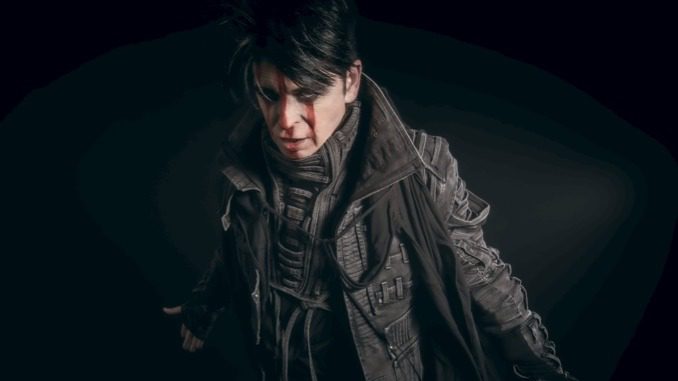There was a period in the late-’70s when Tubeway Army-spawned electronic trailblazer Gary Numan was simply way ahead of his time. With the Brit’s first solo set in 1979, The Pleasure Principle, it was hard to say which was more chilling—the cold, clinical precision of his guitar-parroting synthesizers, the bleakness of his “Cars”-futuristic vision, or the aloof, almost robotic singing voice in which he delivered all of his dispassionate observations. Outside of de-evolution-stressing Midwest misfits DEVO, there were few artists viewing society in the same dry, dystopian way, like the man who fell to Earth writ large.
But now, at a seasoned 63 and with an Ivor Novello Award under his belt, the former odd man out feels right at home in a bleak future he sensed was coming, wherein technology is gradually gaining the upper hand over humanity, as we hurtle ever nearer to the Kurzweil-foretold Singularity, when Artificial Intelligence will surpass that of man. Prescient films like The Terminator, Twelve Monkeys, and even Blade Runner have bleakly imagined what comes next. But Numan—in his recent grim, unforgiving industrial-strength treatises—2013’s Splinter (Songs From a Broken Mind) 2017’s Savage (Songs From a Broken World), and the bracing new climate-change-conscious Intruder—is sketching clear charcoal renderings of the charnel house that awaits us, right up around the bend. You can trace how he arrived at his theories in his 2020 book (R)evolution: The Autobiography, or you can sink deep into the ominous, but remarkably human zeitgeist snapshots on Intruder, from its deceptively gentle openers “Betrayed” and “The Gift” through a conversely velvet-textured “I Am Screaming,” the NIN-strength title track, a grinding “Is This World Not Enough?,” a clattery “The Chosen” and a positively majestic “The End of Dragons.” One ballad, “A Black Sun,” was co-written by his daughter Persia, who sings on several songs, as well, alongside her sister Raven (a poem by his youngest daughter, Echo, inspired the whole extinction-edgy album, dad reveals).
Given our foreboding, Trump-ignorant, science-denying, self-centered era—and deadly unforeseen curveballs like the coronavirus—it makes perfect sense that Numan, now based in Los Angeles, has been experiencing a U.K.-chart-topping Renaissance of late. The times have finally caught up to him after 18 albums. “And when I first started to write Intruder, it was long before the pandemic, and there were already songs in there about the Earth fighting back—it was already a part of the album,” says the singer, whose voice has grown warmer and more inviting on his newer material. “So when Covid came along, in a kind of horrible coincidence, it just gave frame to what I was already writing anyway. And I started to think of Covid as the first of many ways that the Earth would start to fight back, because there’s nothing more sophisticated than a deadly virus.” So something wicked this way comes? With all due apologies to Ray Bradbury, Numan sighs, no. It’s already here. Ironically, he spoke to Paste on what should have been an otherwise uplifting occasion, Earth Day …
Paste: So, uhh, Happy Earth Day today. I think.
Gary Numan: Ha! Yeah. I’ve got to post something, but I don’t quite know what to say without sounding like a doom-monger.
Paste: Well, there is some good news, hopefully. Biden swears that we’ll cut greenhouse emissions by half, China plans on phasing out oil, India will stress renewable energy—even though India only yesterday just had 315,00 new cases of coronavirus—and Japan is supposed to slash emissions by 40% by the end of the decade.
Numan: Well, what they’re saying is good. But they’ve got to actually do it. Do you know what I mean? There’s been a great deal of really encouraging things said over the last few years. And I’m not an expert on this, I’m not a politician. So I’m just reading the newspapers and picking up the scraps that I can. But it seems to me that there was a great deal of really inspiring things over the last few years, and then you read that they’ve just given away brand new drilling rights to new oil fields in the Antarctic. And it’s like, hang on—aren’t we supposed to be phasing that out? So if all these things happen, then fantastic—that’s a step in the right direction. But I’m slightly pessimistic about the truth of that assertion, or the truth of that actually happening.
Paste: Bouncing back in time a little, early in the pandemic, I was talking to Wayne Hussey from The Mission, and he said you were one of the first artists to respond to his request for cameos on his “Tower of Strength 2020” charity project. I had no idea you guys were buds.
Numan: Yeah, I love Wayne. And I mean, I think “Tower of Strength” is one of the best songs ever written. I’ve always loved it. Always. And I’m really jealous that I have yet to write anything as glorious as that. So when he asked me to be involved in it, I was really honored, because I would absolutely love to be involved in something like that, and to work on that song. But I was also equally quite nervous, in that it’s such a genius song, and I’ve never felt over-confident about my abilities as a singer. So I was slightly nervous about doing it, and it took me some time to pluck up the courage to do it and send it to Wayne. But I’m really glad I did it. I’m really glad I was involved in it, because it’s a really great thing he tried to do with that—to raise money for the [frontline healthcare workers] cause.
Paste: Which brings up an interesting point, actually—you have always had a truly unique voice and vision, as easily identifiable as, say, Robert Smith’s. And you’ve weathered all the trendy storms over the years, and still, there’s no one out there even remotely similar to you.
Numan: Well, I’ve just always kept at it, you know? And I’ve made lots of mistakes, and I’ve not always made the albums that I should’ve, perhaps. Certainly in the early ‘90s, I did a particularly poor one then. But it was the best I could do at the time—it wasn’t as if I was being lazy or not trying. I was really trying. But it was just a really bad period, and the creative side of me was not happy and it wasn’t coming together, and I had relationship problems, and I was in really bad debt. I didn’t have a record contract—it was just a really shit period, you know? And it kind of shows, I think, in the music—it was just aimless. So I’ve been all through the ups and downs of it all. But I’m pretty optimistic, and I love doing what I do. And there was a period in the middle when I didn’t, to be truthful. And that’s when that album came out and it really shows. But for quite some time now, I’ve been very happy. Ever since I kind of rediscovered my love of music, and effectively kind of turned it into a hobby again, the music that you make is all you think about until it’s finished. And there are no other considerations at all—you’re not thinking about record companies or radio play or any of those career-type things that have an effect on it. You just want to get the music as good as it can be. And that’s what a hobby is—doing something you love for the sake of doing it. Where it changes, of course, is when the record is finished, now you have to go out and try and sell it. And then it switches, it switches into being something else. And this might sound a bit pretentious, but if you can be pure of heart when you’re making it, and it’s just about the music, then I think you’ve made the best album that you can make. And for me, it was finding my way back to that attitude. And that was a challenge, from the mid- to late-’80s, certainly up to ’92, ’93.
Paste: Because art should please the artist first.
Numan: Yeah. And I lost that. And I’m pretty ashamed of that—it wasn’t a good period. But I managed to find my way back by ’94, and ever since then I’ve made albums in exactly the same way every time, including the new one. It’s all about making the music, making the best album you can, and then when it’s done? Now it’s a different thing. We’re gonna talk to the record company and we’re gonna do all the promotion—we’re gonna do everything we can to help it, and to try to get it out to as many people as possible. But it’s something that you’re proud of, something that you did with no other intention than making the best album you could possibly make.
Paste: But one of your coolest career footnotes—and it actually says a lot about the type of fun, big-kid kind of person you probably are—is that you actually now have your own diecast Corgi toy car, a miniature of the wedge-mobile you drove onstage on the Telekon tour. How in the hell did you swing that?
Numan: Heh heh. Oh yeah—I was as excited about that as I was at Christmas when I was four years old! That was great! Corgis were just a huge part of my young life. I had the first James Bond car that they came out with as a kid, the gold one with the bulletproof screen that popped up in the back. It was his Aston Martin, and they made a much better one later. But I was very young back then. But I loved Corgis. And to have your own Corgi is pretty cool, isn’t it? And you know what? It’s a bit time-consuming, and as a company, they are quite pedantic to work with. But bless them, they take it—you talk to them, you talk about having a special edition Corgi car, and if they’re gonna get with it. And it’s pretty expensive, as well. But they were good. My merch man got in touch with them and did most of the dealing with it. But we found somebody there that was supportive of the idea, and you kind of need that, because then that person put it to the various committees and pushed it through and got them to agree to it, explaining what the cost would be for Corgi. And it just came together. So I love it—I really love having my own Corgi! It’s cool! I can’t remember which tour it arrived on, but we’ve had it for maybe two years now. It’s fairly recent.
Paste: Who designed your original car that you’d drive onstage, initially? And how was it powered? And what real-time snafus did you run into with it at various dates?
Numan: It was pretty reliable, really. It was actually an electric wheelchair. Underneath that slightly futuristic, cartoon frame, it was just a standard wheelchair with a 12-volt battery on the back—a very tried and trusted technology, very, very simple. So they built the frame, and I can’t remember the man’s name, it’s been such a long time ago now. But in the lighting company that I used to use, they were very good at building custom-made stage structures and things like that. So they took it on, and they sketched out the frames for it, and we tweaked it a bit here and there. But we ended up with that aluminum frame, which was then positioned on top of the wheelchair—it was as simple as that. And then the control stick that the wheelchair user would normally use was moved from the arm into the center, and that’s how I used to drive it around. And the switches on the front I could turn off and on with my feet, and there were two lights in the front, and then two that came back at me and lit me up. So the only problem I had with that car was trying to get it back into the garage, because it came out from underneath the drum riser. And I couldn’t see backwards, obviously, so I used to have to line it up with the microphone and just to go backwards in as straight a line as I could to get it back under the drum riser again, and then the doors would close and I’d get out. And sometimes, when the mic stand was put down, it wasn’t put down quite central, and I’d always hit the doors and there would be this embarrassing sort of scuffle to try to get the car back under the drum riser again. I should have just gone in forwards, but I never did.
Paste: That’s positively lighthearted compared to some of the truly bone-chilling stories about your lifelong passion of flying that you’ve told me over the years. Like your fuel line freezing over the Atlantic, stalling the engines and sending the plane into a tailspin toward the ocean, only to thaw then sputter back to life again at the last minute.
Numan: Yeah. There’s been a few moments like that. But since the children came along, I kind of pulled out of all the display-flying side of things. And I found conventional light aircraft just a little bit boring, to be truthful. Having done all the other sort of aerobatic stuff before, you know? I mean, I was a display pilot for about 13, 14 years, and all I did, every weekend was, I would be flying at ultra-low levels, upside down, six feet away from another airplane that was also upside down. And it’s really exciting, and really difficult, and really challenging, and fucking dangerous. So when you’ve spent a long time doing that sort of thing, you can’t re-adapt to regular flying, because it just seems so slow and boring. And I did try—I really did. I went about a year or so trying to get back into Cessnas, and I just really couldn’t take to it.
Paste: Spinning off from the Corgi question, though, if you look at the rest of the merch you’re selling—a perfect enamel badge collection, picture discs, colored vinyl—it’s just obvious: You’re a fan. Still just a huge fan.
Numan: I think I am. Everything I do is done as a … my whole sort of attitude for this has been, If I liked it, then there’s a chance that other people will like it, too. Because when I was younger and going out to see bands, I was one of thousands and thousands of people, and we all kind of liked the same thing and we had the same interest in music and merch and all these sorts of things. So I’ve just gone through my whole life assuming that if I like something, and I think I’d like to have it, then other people will probably like that sort of thing, as well. But that’s a fan attitude. That is being a fan of music, being a fan of the whole band way of life. I mean, I still get excited when the merch turns up, and I’m always looking at it, looking at the T-shirts. I’ve been doing it my whole life, and I still get excited by it all. I have to design some Intruders T-shirts, and it’s today, actually, when I finish talking. So I get really excited about that—trying to come up with good ideas and how it’s gonna work, and other little things that we can do, like the Corgi car. The Corgi car was a fantastic addition to what we’re doing. And we’re always doing it—we’re always talking, to and fro, me and the merch boys, about “What can we do? What would be interesting? What would we like to have?” It’s why we’re here, isn’t it? It’s why we like being involved in music—all of that.
Paste: Looking back on it, is there one merch item—like the Gary Numan pogo stick—that never quite caught on?
Numan: Yeah. We did Gary Numan clocks once, which I thought were absolutely gonna fly, because I absolutely loved them. But no, not at all—that didn’t work. They were about 12 inches tall, and it was an image of mine from Berserker, and I had an all-white face with blue hair. It was a very striking image, on top of a clock. But absolutely no one was interested in them. And there was one other one, as well—the fans were pushing me for a long time to do a Gary Numan yearly calendar, with lots of lovely pictures in it. And I did that one, thinking again that I had a winner, and when it was done I thought it looked great. And I thought, “Oh, the fans are gonna love this! This looks fantastic!” And I think we sold about 12, when I’d had two thousand printed! Absolutely nobody wanted it! And I felt almost insulted, because there had been people asking for it, and I’d actually been pushed into it because they were constantly going on about it. But I reckon it was just those same 12 people who just kept on messaging me.
Paste: Now you’ve gotten your daughters involved in showbiz. Who helped out on this record?
Numan: Persia’s on it again, and Raven’s on it—I’ve got two of them singing on about seven or eight songs. They’re on it a lot this time, and Persia wrote one of the songs—or most of it—a song called “A Black Sun,” and the idea behind the album actually came from a poem called “Earth” that my youngest daughter Echo wrote. She wrote the poem about the planet being upset, and why it was upset, and it was talking to the other planets. And I just thought it was a really, really lovely idea, so I kind of stole that idea and turned into Intruder. So on the artwork to Intruder, when you open up the gatefold, her poem is there, as well. So all the kids are on it, in one way or another. But because they’ve given something really valuable towards it, they’re all there on merit. The vocals that they’ve done are beautiful and brilliant, and they really add to the record. And the poem, obviously—that’s the whole reason the album exists in the first place, so that definitely needs to be there. So I’m very proud of them—all three of them have become, or are growing into, very creative kids. And they have amazing ideas and are making fantastic music. Persia is 15 now, Raven’s 17, and Echo’s just turned 14.
Paste: And Persia came out on tour with you, too, right?
Numan: Yeah. She’s done quite a lot of gigs now. She’s probably done 35 or so—she’s done loads of shows now. But at the moment—and I think it’s probably because of the pandemic—my daughters are just really wanting to go back to England, actually. All three of them. They’ve got this real longing—they just really want to go back to England again. And I think part of that is, we do go there fairly often anyway, outside of the pandemic, so they get to see their grandparents and their friends and so on. And they’ve missed that quite a bit. But of late, that’s sort of dominated everything. But they’ve been to some pretty cool places. We played in Chile on the Savage tour, and while we were there we saw Easter Island and spent about a week on Easter Island. So they’ve been to some pretty cool places, and I think it’s good, though—the more kids travel, the more kids see other cultures, and are around people from other part of the world, then the more global they become in their attitudes. The more tolerant, the more understanding, the more sympathetic. I think it makes you a better person to travel in the world.
Paste: It’s interesting that Echo’s poem—no pun intended—echoes Lovelock’s classic Gaia Theory, which posits that the Earth is a living organism, one that we—as its respectful stewards—have simply lost touch with, thereby dooming ourselves to extinction.
Numan: Yes. And to be honest, that’s pretty much what Intruder is all about. Humanity is an ungrateful child that has now come back home and is hurting us. Think of it as a child that’s been loved all its life by its parents. Then it leaves home, becomes a drug addict, comes back home, then beats up the mom because it’s looking for money in the coffee tin. How would that mother feel? Betrayed? Hurt? Disillusioned? Angry? It’s not what she expected, so things have gone horribly wrong. And that’s what we are to the planet, I think. And if nature identifies us as an infestation, then it must have a mechanism by which it could get rid of us. And perhaps that’s what viruses are.




